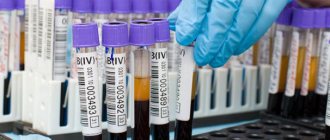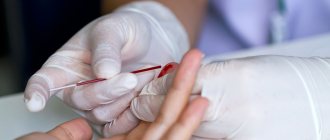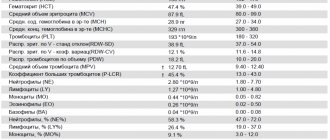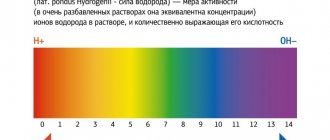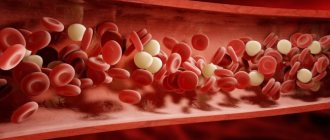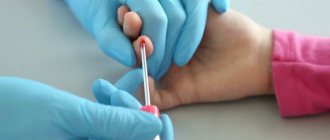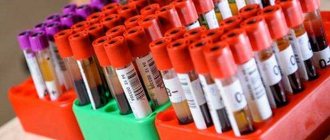RW blood test - what is it?
Blood test RW
- This is a serological test for the detection of antibodies to Treponema pallidum.
The methodology for conducting this study was proposed by August von Wasserman at the beginning of the 20th century, since then the analysis has been named after him - the Wasserman reaction
(RW).
Treponema pallidum is the causative agent of syphilis.
Syphilis is a classic sexually transmitted disease. Transmitted primarily through sexual contact. You can also become infected through blood. There is a possibility of infection through household means, since Treponema pallidum can be contained in undried saliva and other body secretions.
During the course of the disease, primary, secondary and tertiary syphilis are distinguished.
Primary syphilis is characterized by the appearance of a specific ulcer (chancre) at the site of infection (this can be the genitals, oral or rectal mucosa). A little later, the nearest lymph nodes enlarge - inguinal when the genital organs are affected or submandibular when the oral mucosa is affected. The ulcer heals on its own 3-6 weeks after it appears.
Symptoms of secondary syphilis are observed 4-10 weeks after the onset of the ulcer. These include a pale rash all over the body (including the palms and soles), headache, general malaise, and fever (flu-like). Lymph nodes throughout the body enlarge. Then the symptoms disappear, returning from time to time.
Tertiary syphilis is characterized by damage to the nervous system, bones and internal organs. It occurs many years after infection in the absence of proper treatment for the disease.
Thus, a person with syphilis may have long periods during which there are no symptoms. Much depends on the state of the body's immune system. Sometimes, upon contact with an infection, the disease does not develop, but the person becomes a carrier of the infection (the so-called asymptomatic carrier).
In these situations, an RW blood test is the only way to detect the presence of the syphilis pathogen in the body. The analysis also makes it possible to determine how long the carriage of syphilis lasts.
In what cases is it prescribed
The advisability of conducting a blood test for RW has two purposes.
Diagnostic
It involves examining people at risk for developing syphilis or those in whom this disease must be excluded:
- If there are complaints characteristic of sexually transmitted diseases, or unprotected casual sex;
- If there are any manifestations of syphilis;
- During pregnancy. All pregnant women are examined for RV upon registration at the antenatal clinic and again during pregnancy;
- All patients who are hospitalized in medical institutions, especially surgical hospitals;
- All persons undergoing routine medical examinations;
- Medical workers;
- Those in contact with patients with syphilis;
- Drug addicts and HIV patients;
- Persons with prolonged fever and doubts about the reliability of the diagnosis.
A blood test for RW can detect antibodies to Treponema pallidum, the causative agent of syphilis.
Therapeutic purpose
It involves carrying out RW over time for all patients with syphilis. This makes it possible to identify secondary and tertiary forms of syphilis, which are masked under the guise of any diseases of the internal organs. In patients undergoing treatment with an established diagnosis of syphilis, thanks to RW, the dynamics of the process, its activity and the effectiveness of the medications used are determined.
When is an RW blood test necessary?
The RW blood test is a standard procedure to confirm the absence of the syphilis pathogen in the body. It is necessary for everyone whose profession involves contact with people or food - doctors, cosmetologists, hairdressers, cooks, etc. An RW blood test is also one of the mandatory procedures during pregnancy. It is carried out upon registration and in the third trimester (at the 30th week).
An RW test can also be prescribed when symptoms appear that make one suspect the possibility of syphilis infection:
- rashes on the skin and mucous membranes of unknown origin;
- enlarged lymph nodes (primarily inguinal);
- ulcers on the mucous membrane and discharge from the genitals.
It is recommended to take an RW test if you have casual sexual contact. However, it must be borne in mind that the analysis will be indicative only 5-6 weeks after sexual intercourse. Before that, the analysis may be negative even if infection occurs.
Indications for analysis
Medical workers, employees of cosmetology and dermatology offices, and food workers are required to donate blood for RV. Other indications for a specific test are:
- pregnancy planning;
- preparation for operations;
- unprotected sex (especially with a new partner);
- suspicion of sexually transmitted infections;
- blood or sperm donation;
- the appearance of an incomprehensible rash on the mucous membranes and skin, discharge from the genitals, disruption of the menstrual cycle in women;
- visible enlargement of lymph nodes (especially in the groin area).
Interpretation of RW blood test results
The result of the RW blood test may be:
Wasserman reaction
- negative. This means that antibodies to the causative agent of syphilis have not been detected. In most cases, such a result indicates that there is no Treponema pallidum in the body. However, with primary and tertiary syphilis, there may be cases of negative test results. Therefore, to be sure that you are not a carrier of the disease, the test must be taken several times.
- doubtful (about);
- weakly positive (“++”);
- strongly positive (“+++”).
A questionable and weakly positive reaction is also possible in the absence of syphilis infection. Thus, in 1.5% of pregnant women an erroneous weakly positive reaction is detected. A false positive RW result can be observed after vaccination, as well as with tuberculosis, diabetes, cancer, pneumonia, and viral hepatitis.
If there is a possibility of a false positive result, the test should be repeated.
How is it done and what kind of blood is needed for analysis?
The material for analysis can be any blood, either from a vein or from a finger. The specificity and reliability of the analysis depends on many factors. It is important to consider that this is a nonspecific test that has a large number of false positive and false negative results. Therefore, it cannot be relied upon with complete confidence in any case. This is due to the fact that blood from a finger can only be examined using the microprecipitation reaction
It allows you to quickly determine the presence of antibodies in the body. But their specificity cannot be determined. Such antibodies can be any proteins formed in large quantities during any infectious processes, immediate or delayed allergic reactions. This means that the true disease can masquerade as a false positive RW and be mistaken for syphilis. On the other hand, venous blood from a finger is not able to detect small concentrations of specific antibodies to the causative agent of syphilis in the initial stages of the disease or during its sluggish course. This causes a false negative result.
Important to remember! The diagnostic value of a finger prick blood test for RW is so low that it makes this method of conducting it impractical in medical practice. More reliable results can only be obtained by examining venous blood. Unlike finger prick analysis, which makes it possible to examine only a small amount of whole capillary blood, plasma can be obtained from venous blood, which contains all the antibodies circulating in the body!
Do not forget about the correctness of the research. It is best to donate blood in the morning or at least on an empty stomach. The day before, strong physical and psycho-emotional stress is excluded. It is advisable to minimize the administration of drugs that affect the activity of the immune response and cause an allergic reaction.
What to do if the RW result is positive?
If a positive RW result is obtained upon repeated analysis, the presence of the syphilis pathogen in the body is considered confirmed. In this case, it is necessary to urgently begin treatment.
Syphilis is highly treatable, especially in the early stages. The persistence of the pathogen in the body threatens the transition of the disease to the active stage and the development of manifestations of secondary and tertiary syphilis. The presence of Treponema pallidum in the body of a pregnant woman threatens not only her health, but also the health of the child: infection of the fetus, as a rule, leads to serious developmental disorders. Death is also possible.
The significance of the Wasserman reaction
Timely blood testing for RW allows you to:
- clarify the final diagnosis for primary syphilis;
- determine the timing of possible infection (the reaction gives a positive result in 50% of patients in the sixth week, in 90% in the eighth);
- make a diagnosis in the latent course of the disease, this is especially important for neurosyphilis and the visceral form, when the patient is examined by doctors of different specialties, but the treatment does not work;
- evaluate the effectiveness of the therapy, remove recovered persons from the dispensary register;
- examine all persons from the environment of the sick person (the source of infection) for the purpose of timely preventive treatment;
- forensic medical experts to find out complete information in a criminal case.
Where can I get an RW test in Moscow?
If you need to do an RW blood test in Moscow, contact Family Doctor JSC. At Family Doctor you can get tested for RW on weekends and holidays.
It is possible to donate blood for RW at any of our clinics. Obstetricians-gynecologists, dermatovenerologists and urologists of the “Family Doctor” are always ready to advise you on the results of the analysis and, if necessary, prescribe an effective course of treatment.
Sign up for diagnostics Do not self-medicate. Contact our specialists who will correctly diagnose and prescribe treatment.
A little history
RW is short for the Wassermann reaction, which is over 100 years old. The famous German immunologist August Paul von Wasserman proposed using a special test to diagnose syphilis in 1906. True, at that time he was not yet a “fon”; he was awarded the nobility later, seven years later, for his services in research in the field of infectious infections (diphtheria, typhoid, cholera). In 1928, at the congress of Russian epidemiologists and microbiologists, a blood test for RW was officially adopted in Russia as a mandatory study. Since then, indications for implementation have been introduced in the form of standards and are relevant to doctors of any specialty.
Decoding
The results form includes pluses or minuses. The latter speak of a negative reaction and absence of illness. A positive reaction can be described with one to four plus signs. The transcript shows the stage of the disease:
- ++++ or +++ – positive test;
- ++ – weakly positive;
- + – doubtful, requires re-checking.
If the RW analysis shows a negative result, this does not exclude that a person has syphilis at the first or third stage. Plus, a negative reaction may indicate the destruction of red blood cells. The secondary period of syphilis does not always show a positive result. In the first 17 days the reaction may be negative, and only by the sixth week it may show ++++, and even then only in 25% of patients with syphilis. After this, the reliability approaches 80%. Approximately 5% of healthy people show a false positive result.
- Proper nutrition for weight loss: menu for every day
- How not to gain weight during pregnancy - nutrition and menu. Norms for weight gain during pregnancy by month
- Burning in the intimate area in women
RV test is positive
If the test for RV is positive, this indicates the presence of antibodies to Treponema pallidum in the blood - that is, about 1.5 months have passed since the infection. Other reasons for the appearance of ++++ on the results sheet are:
- carrying out antisyphilitic therapeutic measures - reducing the acute process;
- pregnancy in the absence of the disease itself - the analysis will be weakly positive in approximately 1.5% of women;
- primary syphilis – 80% of cases at 6-8 weeks;
- secondary syphilis in 100% of cases;
- clinical relapse of the disease;
- tertiary period of the disease - in 75% of cases;
- early congenital syphilis.
RW negative
If you receive a negative test result, you can talk about the absence of infection and antibodies to syphilis in the body, but this is not always the case. In the early stages of the disease, the results will be negative because antibodies simply do not have time to develop. Plus, certain diseases and individual characteristics of patients influence the reliability failure.
